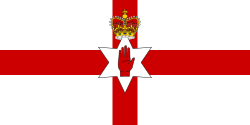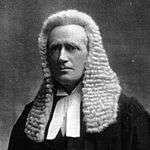Leader of the Opposition (Northern Ireland)
 |
| This article is part of a series on the politics and government of Northern Ireland 1921–72 |
The Leader of the Opposition in Northern Ireland was theoretically the leader of the largest party in the House of Commons of Northern Ireland which was not the government. The position was eliminated in 1972 when the Stormont Parliament was abolished and replaced by direct rule from London.
Abstentionism
Through the existence of the Stormont Parliament, members of the Irish nationalist opposition often practiced a policy of abstentionism where they would run for seats in the parliament but refuse to take them if elected in order not to give legitimacy to British rule or the partition of the island and refused to accept recognition as the Official Opposition until 1965 despite the fact that they were the second party in the House of Commons in terms of seats won from 1925 until 1972 and had been tied for second with Sinn Féin (which was also abstentionist) in the first Northern Ireland House of Commons from 1921 to 1925.
Though the Nationalist Party was consistently the second largest party in the House of Commons its members refused to take their seats in the legislature until 1924, then resumed the abstentionist policy in the 1930s to protest the abolition of proportional representation. From 1937, Thomas Joseph Campbell and Richard Byrne were the only Nationalist MPs to take their seats until Byrne's death in 1942 and Campbell's resignation in 1945. It was not until 1965 that the Nationalist Party agreed to form the Official Opposition in the House of Commons. Eddie McAteer served as Leader of the Opposition from 1965 until he lost his seat in the 1969 election. Roderick O'Connor succeeded McAteer as Nationalist Party leader but the party again withdrew from its role as Official Opposition.
Leader of the Opposition
This is a list of people who served as the de facto Leaders of the Opposition of Northern Ireland, being leaders of the largest party in the House of Commons of Northern Ireland which was not the government.
| No. | Name (Birth–Death) |
Portrait | Constituency | Term of office | Party | Prime Minister | |||
|---|---|---|---|---|---|---|---|---|---|
| – | None | 1921 | 1925 | Sir James Craig (1921–40) | |||||
| 1. | Joseph Devlin (1871–1934) |
Belfast West (1925–1929) Belfast Central (1929–1934) |
1925 | 1934 | Nationalist Party | ||||
| 2. | Thomas Joseph Campbell (1871–1946) |
 |
Belfast Central | 1934 | 1945 | ||||
| John Miller Andrews (1940–43) | |||||||||
| Sir Basil Brooke (1943–63) | |||||||||
| 3. | James McSparran (1892–1970) |
 |
Mourne | 1945 | 1958 | ||||
| 4. | Joseph Francis Stewart (1889–1964) |
 |
East Tyrone | 1958 | 1964 | ||||
| Terence O'Neill (1963–69) | |||||||||
| 5. | Eddie McAteer (1914–1986) |
 |
Foyle | 1964 | 1969 | ||||
| 6. | Roderick O'Connor (1910–2000) |
 |
West Tyrone | 1969 | 1972 | James Chichester-Clark (1969–71) | |||
| Brian Faulkner (1971–72) | |||||||||
Northern Ireland Assembly
After the introduction of power sharing in the Northern Ireland Assembly, all willing parties who achieved adequate levels of support were invited into the Northern Ireland Executive. Starting in 2016, however, some qualifying parties choose to form an opposition. While no "Leader of the Opposition" has yet been nominated, the opposition leaders from that era are as follows:[1][2]
- Mike Nesbitt (2016–present; Ulster Unionist Party)
- Colum Eastwood (2016–present; Social Democratic and Labour Party)